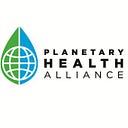Philip Elders, 2019 Planetary Health Campus Ambassador
By Philip Elders, 2019 Planetary Health Campus Ambassador
Hi all interested blog readers! My name is Philip Elders and I’m currently a 3rd year graduate-entry medical student at the VUmc school of medical sciences in Amsterdam, the Netherlands. During this past year I have been a planetary health student ambassador at my university. I want to start off this blog post with that the student ambassador program has been a great opportunity and enabled me to inform other students about this exciting field and most importantly got me into contact with others that are passionate about planetary health, which is exactly what I hoped for at the start of the program!
I applied to become a planetary health student ambassador, because I’ve always had a strong interest in environmental issues and had been following the development of the planetary health field for a while online and at different conferences I attended, such as the EAT Stockholm Food Forum. Reading and hearing about the research motivated me to get more involved with planetary health, but I found it difficult to find others that were interested or working on the same issues in Amsterdam. Applying to the student ambassador program helped me focus my thoughts of what I potentially wanted to achieve. After being selected, it was incredibly useful to speak to other student ambassadors, people working at the Planetary Health Alliance and with a mentor, whom was an educator in planetary health. This helped me to further develop my ideas on what I could do as a student ambassador, but also gave me some confidence that I could use materials that the alliance had developed to give a workshop about planetary health for a group of other graduate-entry medical students. In this workshop, I gave an introduction about the field, we read several articles about the effects of climate change and deforestation on infectious diseases, the effects of pollinator loss on nutrition and the EAT-Lancet planetary health diet.
At the end of the workshop we discussed the outcomes of these studies and how we could apply this to clinical practice, but also the importance of finding solutions with co-benefits for both the environment and human health. A couple of students were very excited to find a field in which they could combine their worries about environmental issues and their education in medicine. The course coordinator of the graduate-entry medical program was also present and said she was amazed that this was not covered in our medical curriculum at all, since these were such important topics. After the workshop, she got me into contact with the public health course coordinator, whom wanted to develop a new study assignment for all medical students. Using research listed on the planetary health alliance website, I developed an assignment on the effects of air pollution on human health and made them discuss potential solutions that could have co-benefits for both the environment and human health.
For the coming year, I will be the Dutch youth delegate to the WHO and will attend the world health assembly with the Dutch delegation. In this role as youth delegate, I have found a group of other students in the Netherlands at the International Federation of Medical Students Association (IFMSA) that are passionate about planetary health. I have recently given the planetary health workshop for a group of medical students at IFMSA (see picture) and will give another workshop on planetary health at a conference on climate change and health in Amsterdam, to also have some focus on other environmental issues. In addition to this, we are trying to look for ways to put planetary health on the policy agenda in the Netherlands and educate more medical students and the general public about planetary health, since we believe that the degradation of our natural systems will become the biggest threat to human health in the future if we do not take drastic actions. Planetary health is a paradigm shift and I believe we need this different way of thinking in medicine to be able to tackle the health challenges of the future and be able to prevent more people from falling ill than purely focus on treating patients that have already fallen ill. My ambition is to keep working on the intersection of environmental issues and human health in the future as a medical doctor and contribute to finding and implementing solutions that are beneficial to both nature and humans.
I would strongly recommend other students that are passionate about planetary health, but aren’t sure how they can do something with it, to get started by organizing something small, such as a workshop or a movie screening. This will help you get in touch with others that are interested in planetary health and hopefully find ways together to further start working on educating others and implementing planetary health solutions in your own local area.
I would be very happy to further share my experiences or get in touch with others (considering) working on planetary health!
Philip Elders (philipelders@hotmail.com)
